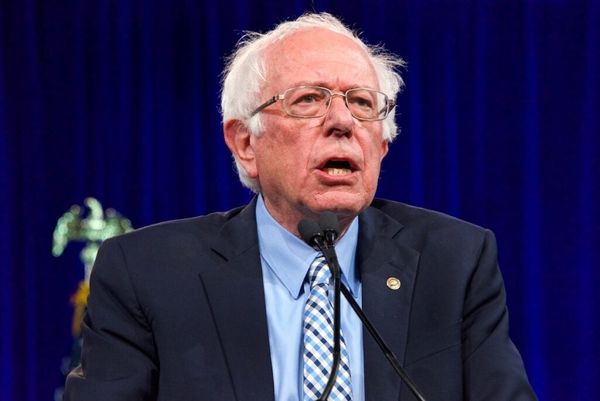
The Senate on Sunday made significant progress towards ending the longest US government shutdown in history, narrowly advancing a compromise bill to reauthorize funding and undo the layoffs of some employees.
But the measure, which resulted from days of talks between a handful of Democratic and Republican senators, leaves out the healthcare subsidies that Democrats had demanded for weeks. Most Democratic senators rejected it, as did many of the party’s lawmakers in the House of Representatives, which will have to vote to approve it before the government can reopen.
“This healthcare crisis is so severe, so urgent, so devastating for families back home, that I cannot in good faith support this [resolution] that fails to address the healthcare crisis,” said Democratic Senator majority leader Chuck Schumer.
The bill received exactly the 60 votes needed to advance in the Senate, with almost all Republicans voting in favor along with eight Democrats, many of whom are moderates or serving their final terms.
“Republicans control the White House, the Senate and the House, and they made clear over a period of weeks, including just this week, that this was as far as they would go as part of the shutdown talks,” said New Hampshire’s Jeanne Shaheen, a member of the group who is retiring after next year.
“This was the only deal on the table.”
In the 40 days since the shutdown began when the government’s funding authorization expired on 1 October, the Senate’s Republican leader John Thune held 14 votes on a bill approved on a near party line vote by the Republican-controlled House of Representatives, which would have extended funding through most of November.
But no more than three Democrats ever voted in the affirmative, denying it the support it needed to proceed. The minority party demanded that any funding legislation also extend tax credits that lower premiums for Affordable Care Act health plans, which were created under Joe Biden and expire at the end of the year.
Thune maintained that he would be willing to negotiate over those subsidies, but only once the government was reopened.
“After 40 long days, I’m hopeful we can bring this shutdown to the end,” he said shortly before the vote was held on Sunday evening.
“From the precarious situation we’re in with air travel to the fact that our staff have been working without pay for a full 40 days now, all of us, Republicans and Democrats who support this bill know that the time to act is now.”
The compromise legislation authorizes government funding through 30 January 2026 and undoes the firings of federal workers that the White House carried out after the shutdown began. It also guarantees retroactive pay for furloughed federal workers and those who stayed on the job during the shutdown, and prevents further layoffs through January. Included in the compromise are three appropriations bill that will authorize spending through the 2026 fiscal year for the departments of agriculture and veterans affairs, among others.
The compromise does not resolved the issue of the Affordable Care Act premiums, which one study forecast would jump by an average of 26% if the tax credits were allowed to expire.
As part of the deal, Thune said he would allow a vote on a bill to deal with the credits by the second week of December. But even if it succeeds, Republican House speaker Mike Johnson has said he will not put such a measure on the floor.
The compromise bill will now need to be approved by the House and signed by Donald Trump, which may take days. After advancing the legislation, the Senate adjourned until Monday morning, leaving the timing of further voting on the matter up in the air.
Johnson has kept the House out of session since 19 September, in a bid to force Senate Democrats to vote for the GOP spending bill. Shortly after the Senate’s procedural vote on the compromise succeeded, the House told lawmakers to expect votes this week.
But all signs point to a stormy reception for the bill in the chamber, particularly among Democrats.
“America is far too expensive. We will not support spending legislation advanced by Senate Republicans that fails to extend the Affordable Care Act tax credits,” Democratic House minority leader Hakeem Jeffries said. We will fight the GOP bill in the House of Representatives, where Mike Johnson will be compelled to end the seven-week Republican taxpayer-funded vacation.”
Greg Casar, chair of the congressional Progressive Caucus, said: “A deal that doesn’t reduce health care costs is a betrayal of millions of Americans counting on Democrats to fight for them. Republicans want health care cuts. Accepting nothing but a pinky promise from Republicans isn’t a compromise – it’s capitulation.”
Just before the Senate voted, Democratic congressman Ro Khanna called for Schumer to “be replaced”, saying he was “no longer effective”. “If you can’t lead the fight to stop healthcare premiums from skyrocketing for Americans, what will you fight for?”
Relegated to the minority in both chambers of Congress by voters after last year’s elections, Democrats seized on the lapse in government funding to make a stand on healthcare, long a signature issue of the party.
In the more than five weeks that followed, polls showed the public believe the GOP was more to blame for the shutdown than the Democrats, and last Tuesday, the party swept off-year elections, in what Democratic leaders called a validation of their strategy in the funding fight.
The weeks of unfunded government have taken a toll across the United States. More than 700,000 federal workers were furloughed, and hundreds of thousands more made to work without pay, leading to increasingly long lines at food banks and other social services nationwide as the missed paychecks piled up.
At the start of November, the Trump administration moved to pause payments from the federal government’s largest food aid program for the first time ever, prompting an ongoing court fight.
Transportation secretary Sean Duffy last week ordered a nationwide reduction in commercial air travel, saying air traffic controllers were facing unprecedented strain. More than 2,500 flights were canceled on Sunday, and Duffy said capacity would be slashed further on Tuesday if funding was not restored.







